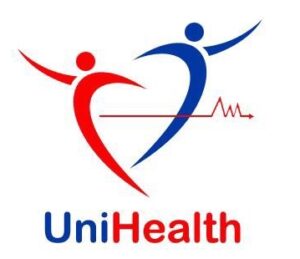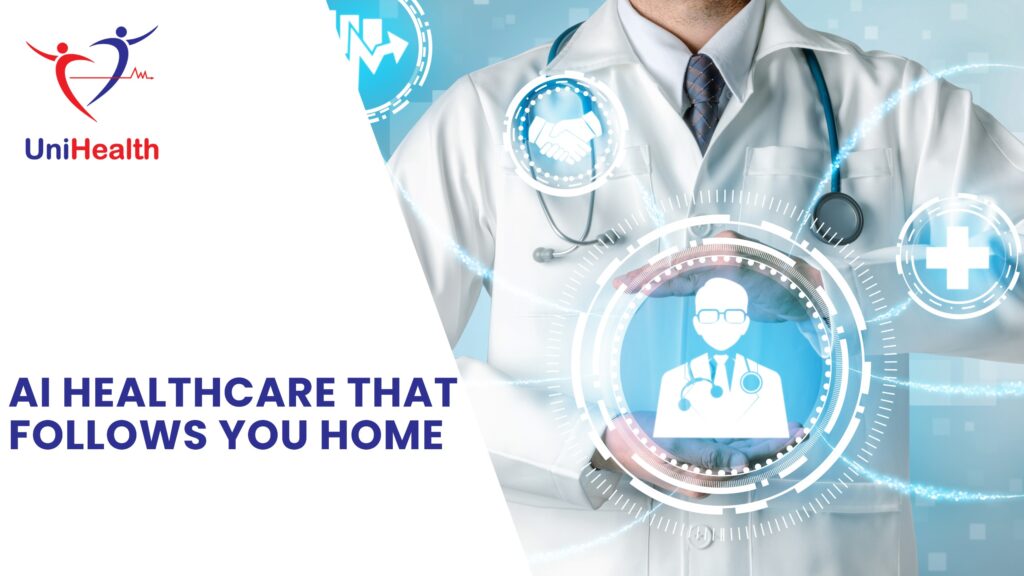A New Era in Patient-Centered Care
In today’s digital-first world, AI in healthcare is emerging as a powerful solution not only inside hospitals—but also far beyond them. Imagine a patient recovering at home after surgery, with their vital signs monitored in real-time by wearable devices. Their doctor, miles away, is immediately notified of any abnormal patterns. This is not a futuristic concept—this is the power of artificial intelligence in healthcare and remote patient monitoring working together.
Health technology is no longer bound to hospital walls. From virtual check-ups to automated alerts, AI is bringing medical care directly into living rooms, especially for chronic disease patients, the elderly, and those in remote areas.
1. What Is AI in Healthcare?
The World Health Organization (WHO) defines AI in healthcare as the use of intelligent algorithms and technologies to interpret data, assist in clinical decision-making, and manage patient outcomes. It includes:
– AI-assisted diagnostics
– Predictive analytics for disease progression
– Natural language processing (chatbots, documentation tools)
– Remote patient monitoring through wearables and smart devices
This use of artificial intelligence in healthcare promotes faster, safer, and more personalized treatment—anytime, anywhere.
2. Why Remote Patient Monitoring Matters More Than Ever
Remote patient monitoring (RPM), backed by government and WHO guidelines, is a cornerstone of digital healthcare transformation. Especially during and after the COVID-19 pandemic, RPM has gained rapid traction.
Real-World Importance of RPM:
– In India, the Ministry of Health and Family Welfare (MoHFW) has promoted telemedicine platforms like eSanjeevani, connecting over 130 million patients virtually.
– In the U.S., Medicare expanded RPM coverage to encourage AI in healthcare beyond hospitals.
– The NHS in the UK supports remote monitoring kits for COVID-positive patients and those with chronic illnesses.
By combining RPM with artificial intelligence in healthcare, patient care is transformed from episodic to continuous.
3. The Power of AI-Enabled RPM at Home
Clinical Precision
Wearables like smartwatches, ECG patches, and glucose monitors feed data to AI systems. These systems detect subtle changes and alert doctors in real time.
Early Detection
A patient’s sudden oxygen drop at night or irregular heartbeats can be detected instantly. This is how AI in healthcare enables early intervention.
Chronic Illness Management
Patients with diabetes or heart disease benefit from daily AI-based health insights. They get reminders for medication, customized diet tips, and alerts for abnormal vitals.
Resource Efficiency
AI reduces hospital overcrowding and clinician burnout by automating monitoring and communication tasks.
4. WHO Standards & Ethical Oversight
To ensure safety and trust, the WHO has laid out six ethical principles for using artificial intelligence in healthcare:
1. Protect human autonomy
2. Promote human well-being and safety
3. Ensure transparency
4. Foster accountability
5. Promote inclusiveness
6. Sustain environmental and societal well-being
Governments are adopting these guidelines to ensure ethical, equitable, and efficient implementation of AI in healthcare and remote patient monitoring tools.
5. How AI in Healthcare Supports Patients at Home
The real value of AI in healthcare is how it impacts patients in their everyday lives. Whether someone is managing a chronic condition, recovering from surgery, or monitoring general wellness, artificial intelligence in healthcare ensures constant, personalized support at home.
Home-Based Health Empowered by Technology
– A diabetic patient in Delhi uses a glucose monitoring device integrated with artificial intelligence in healthcare. This device tracks sugar levels and syncs with a mobile app, which uses AI in healthcare to generate daily reports and alerts both the patient and their physician if anything unusual is detected.
– An elderly woman in rural Maharashtra wears a smart wristband that’s part of a remote patient monitoring system. This device tracks her heart rate, oxygen levels, and body temperature. AI in healthcare interprets this data and triggers alerts if there’s any sign of deterioration. With this support, she avoids unnecessary hospital visits.
– A post-operative cancer patient in Uganda is enrolled in a digital health program that uses artificial intelligence in healthcare to monitor symptoms like fatigue, pain, or medication side effects. Through remote patient monitoring, her doctor can adjust medications in real time, ensuring a safer recovery at home.
– A hypertensive patient in Kenya uses a smartphone app that relies on AI in healthcare to recommend daily activity levels and manage stress through breathing exercises. This is made possible by insights drawn from remote patient monitoring devices that track physical activity and blood pressure.
– An asthma patient in Hyderabad uses a smart inhaler synced with artificial intelligence in healthcare. It monitors inhaler use, environmental triggers, and breathing patterns, helping doctors personalize the treatment plan through AI in healthcare algorithms.
Conclusion:
In all these scenarios, AI in healthcare allows doctors to deliver individualized care without requiring patients to physically visit a clinic. The combined use of artificial intelligence in healthcare and remote patient monitoring ensures safety, reduces costs, and enhances comfort.
By providing 24/7 access to medical insights, AI in healthcare enables people to manage their health confidently and proactively from their own homes.
Whether it’s remote patient monitoring for the elderly, chronic disease support, or rehabilitation care, the role of artificial intelligence in healthcare continues to grow in importance. More patients today are benefiting from AI in healthcare solutions than ever before, proving that smart healthcare can truly follow you home. Connect today!!!

